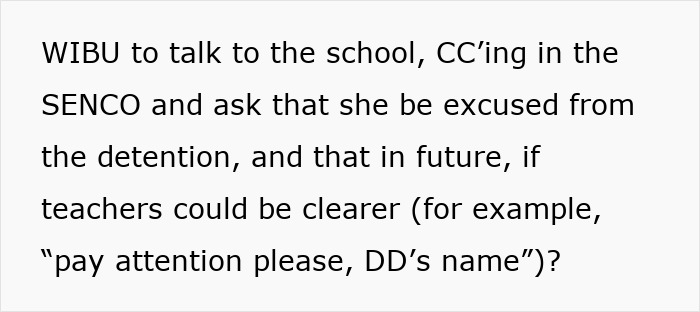Sometimes, being brutally honest isn’t the best life strategy. You might think you’re simply telling the truth, but society has a way of twisting it into something else. However, for people with autism or other social-communication difficulties, honesty isn’t a choice, it’s how they naturally express themselves.
Case in point today’s Original Poster (OP) whose daughter’s brain interprets communication literally, and who had to recently discover that honesty really isn’t always the best policy. As for the OP, she was left wondering if she would be unreasonable if she would be wrong to call it out.
More info: Mumsnet
Misunderstandings can happen to anyone, but for people who struggle with social cues, like many autistic individuals, the consequences can be surprisingly high

Image credits: cookie_studio / Freepik (not the actual photo)
The author shared that her daughter was autistic and had troubles reading social cues which meant that she was honest at all times


Image credits: ThisFairShark

Image credits: EyeEm / Freepik (not the actual photo)
During a science class, the daughter’s teacher reportedly asked if she was bored to which she replied honestly that she was “a little” bored


Image credits: ThisFairShark

Image credits: stockking / Freepik (not the actual photo)
The class laughed at her response, and the teacher reportedly assigned her a lunchtime detention


Image credits: ThisFairShark
The author explained that her daughter didn’t intend to be disrespectful and felt that the punishment was unfair, wondering if she would be unreasonable for calling it out
The OP noted that her daughter has long struggled to interpret social cues due to autism and is explicitly stated in her support plan. However, during a recent science class, her daughter wasn’t entirely focused on the lesson. Sensing her inattention, the teacher asked if she was bored to which responded honestly that she was.
Her classmates burst into laughter, and for that, her daughter was handed a lunchtime detention scheduled for the following week. The OP knew that her daughter had no intention of being rude, and that simply lacked the instinctive social awareness to read subtle cues that neurotypical students often pick up on automatically.
She explained to her daughter afterwards that the teacher’s question was really just a way of saying “pay attention”. Yet, the detention remained on the books, and that felt a bit unfair after all, her daughter’s behavior wasn’t intentional, malicious, or defiant.
This left her wondering if she would be unreasonable to contact the school, loop in the Special Educational Needs and Disabilities (SEND) team, and ask the staff to give clearer, more literal instructions in the future.

Image credits: garetsvisual / Freepik (not the actual photo)
Autistic children or those with social-communication difficulties often experience challenges in interpreting social cues, including tone, facial expressions, or implied meaning. As Simply Psychology notes, responses that may seem rude can actually reflect differences in social awareness rather than intentional defiance. Therefore, honest responses can easily be misinterpreted by neurotypical peers or adults.
However, this is where the role of a school’s support system becomes crucial. Teachwire explains that Special Educational Needs Coordinators (SENCOs) oversee a school’s approach to supporting pupils with special educational needs or disabilities (SEND). They coordinate tailored support plans, ensure interventions meet individual requirements, and act as a bridge between teachers, parents, and external specialists.
Effective communication strategies are equally important in preventing misunderstandings. According to Autism Speaks, instructions for autistic students should use clear, concise language and short sentences, avoiding vague or abstract terms. In fact, they recommend positive phrasing to help students understand expectations more clearly.
For example, in the OP’s daughter’s case, a teacher explicitly asking her to “pay attention” instead of phrasing it indirectly as a rhetorical question could have avoided the confusion that led to the lunchtime detention.
Netizens felt strongly that the detention was appropriate, emphasizing that the OP’s daughter’s honesty doesn’t excuse rudeness. They noted that learning social boundaries early is important, especially before entering the workplace. They also suggested handling the situation with some nuance, acknowledging her autism while still addressing the behavior.
What do you think about this situation? Do you think the detention was fair, or should intent matter more than the outcome? We would love to know your thoughts!
Netizens insisted that the detention was appropriate as the daughter’s honesty doesn’t excuse rudeness














 Follow Us
Follow Us





